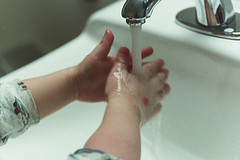
Obsessive Compulsive Disorder (commonly known as OCD) is a mental illness characterized by a time consuming, obsessive and compulsive oriented disorder that generally forms during childhood or early adulthood. An obsession is something that consumes one's mind, feelings and thoughts. Compulsions are something a person needs to perform, an act that one can not control. Though people vary, as do their life and environments, their symptoms tend to be based on the same "theme." For example, making sure things are orderly or checking if the door is locked numerous times. Normal everyday tasks become extremely difficult and tedious for those diagnosed with this disorder. Germs, paranoia, and cleanliness are only a few of the many obsessions and compulsions many suffer from.
Symptoms of OCD are obsessions, or compulsions, that reoccur daily and can take up more than an hour a day. It is a severe disorder that takes up a lot of time out of a person’s day. Anxiety and distress play a huge role in what kind of obsessions and compulsions the person may have. [1] There is a general “theme” to obsessions. Fear of germs or being contaminated (which is why people won’t stop washing their hands), having everything neat and orderly (for example the clothes in their closets being color coordinated), sexual thoughts and violent and aggressive outbursts. The symptoms of obsessions can be violent thoughts of hurting your children or someone else, skin sores from picking your skin, and even hair loss because of hair pulling. Compulsions have a general “theme” as well as obsessions. Like washing, counting, cleaning, orderliness etc. The symptoms of compulsions differ in some ways from obsessions. Some symptoms may be, washing your hands so much that your skin becomes raw, repeatedly making sure the doors are locked, and making sure the stove is off. [2]
The causes of OCD have been studied and observed for many years. One conclusion that was brought about was that there might be a few different kinds of OCD and that the kind that begins in childhood may be different then the kind that appears in adulthood. Brain dysfunction, life, genetics, infection, and depression can all be causes of OCD. Serotonin, which is a neurotransmitter, allows the nerve cells to communicate with each other by being in the space between the nerve cells. Serotonin is involved with our mood, sleep, eating habits and pain. It is said that Serotonin is capable of connecting to the nerve cells in the brain in many different ways. This can cause many different responses which can lead to OCD problems. Genetics is always a good explanation to diseases and disorders. It is not conclusive that OCD can be generic. However, the likely hood of a family member who is diagnosed with OCD, increases the chances of a child getting the disorder as well. If there is no history of OCD in the family their chances decrease. If an infection is involved or does appear, the most common infection leading to OCD is a strep throat infection. This is when the body confuses the healthy cells with the infection and brings damage to the cells. However if this were to happen within the brain, the body’s immune system would attack the outside of the nerve cells which would then lead to symptoms of OCD. (Which is rare) Depression seems to be the number one problem when dealing with OCD. When you have OCD, depression follows; and when you get depressed some OCD symptoms may follow as well. [3] When a woman is pregnant the symptoms worsen, due to anxiety and the thoughts of worrying about her baby. The environment you are in can affect your symptoms greatly. Of course when you are involved in an abusive home, or your work environment is less then ideal, it could increase your behavior and obsessions. [4]
Treatment of OCD usually consists of counseling and medication. A therapy that seems to be the most helpful and productive is called Exposure and Response Prevention. It exposes you to your obsessions and makes you face and overcome them. Some therapists may have you write out your obsessions: those that give you the most anxiety and those that may give you little or if any at all. When dealing with medication, antidepressants are the best fit for those struggling with OCD. Doctors prescribe a drug called Selective Serotonin Reuptake Inhibitor, or (SSRI). Prozac is an example of this drug. You can start to see progress and feel better in approximately 1 to 3 weeks. Although it may take up to about 12 weeks until you finally notice results. If this treatment does not work however, there is another option to try. It is called Deep Brain stimulation. Deep Brain stimulation is when they place something called electrodes in the brain that helps in another process called magnetic stimulation. This stimulation has only been tried in extremely rare cases of OCD and only if nothing else is working.
The diagnosis of OCD is based on the type of symptoms you are struggling with. Four types of symptoms that differentiate OCD from other mental illnesses are: the amount of distress, if their symptoms take up an hour or so a day, if they intrude and affect their personal life such as jobs and relationships, and if the person dealing with these symptoms notice that they are getting out of control. [6]. The likelihood of a person being aware of their obsessions and compulsions is not always high, like with children. OCD can be misdiagnosed. There are so many mental disorders and anxiety and depression disorders that diagnosing OCD can be difficult. However, the thinking process and actions people with OCD have do differ from those other disorders. The thought processes that are behind anxiety disorders are considered reasonable and realistic, unlike that of OCD. Also, if the person has a ritual that follows their thoughts often shows that they indeed have OCD. [7]
|
||||||||||||||||||||